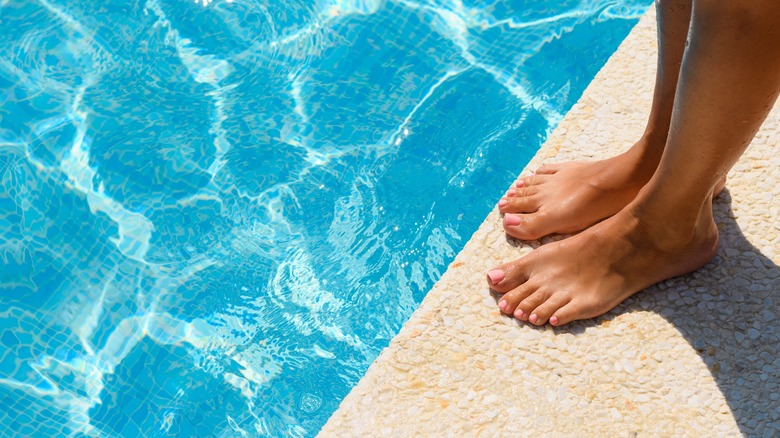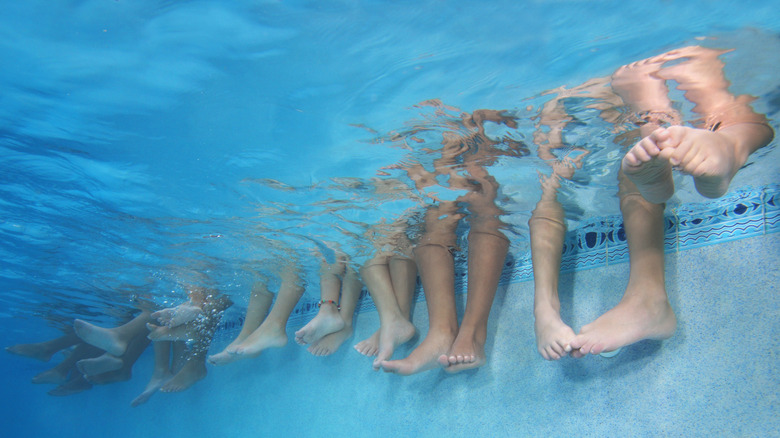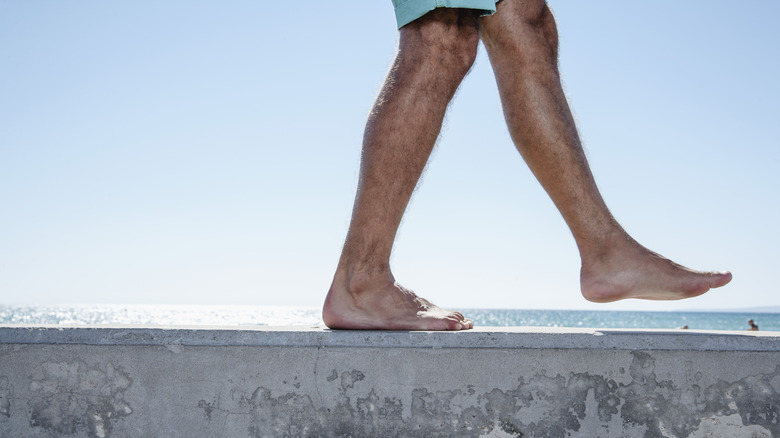Why You'll Think Twice Before Walking Around A Pool Barefoot On Your Next Vacation
A vacation packed with adrenaline-fueled activities is always exciting, but truth be told, no-pressure staycations at a hotel or resort can be just as satisfying. It gets even better when there's a pool involved, allowing you to unwind by the water, drink in hand, a good book in the other, and all your stress just floating away. If luck's on your side, you might even get the pool to yourself — no cannonballing kids, just you and that sparkling water. You can dive in and out at your leisure or simply stroll around because why not? Just be sure not to walk barefoot by the pool unless you're looking to invite a bacteria party to your feet — or worse, catch an infection.
Much like how you'd think twice before kicking off your shoes on a plane, you'll want to reconsider ditching your flip-flops when walking near a pool, no matter the location. Whether you're at a fancy hotel with an Insta-worthy luxurious pool or making do with your cruise ship's mini one, your feet deserve some protection. It doesn't take a genius to figure out why. Surfaces can be crawling with bacteria, and your feet are quick to pick them up. Poolsides, in particular, are normally warm and moist, making them the perfect condition for all sorts of nasty stuff to flourish. So unless you're hoping to bring home more than just a tan, keep those flip-flops on and let your feet thank you later.
Walking barefoot could lead to infections
Don't be fooled by those TikToks that peddle the concept of "grounding" (that's for another discussion). When you're in a pool area, make it a point to place your toes into your trusty pair of flip-flops to keep your feet protected from gross elements. Speaking with The Mirror, Gabriel Miller of Gatsby Shoes explained just how risky it is to stroll around barefoot in public places like the pool.
"Walking barefoot exposes you to pathogens like plantar warts, athlete's foot, and ringworm, which thrive in these conditions. These organisms can easily invade small cuts or abrasions on unprotected feet, leading to uncomfortable and sometimes serious infections," they noted, adding that aside from getting in contact with bacteria, you may hurt yourself, too. "Unexpected sharp edges on pool decks can easily cut skin, making you more susceptible to infections in a high-bacteria environment."
And just when you thought it couldn't get worse — fungus! Wet areas are a fungi paradise, and you might be inviting it along for the ride if you decide to wander around barefoot. "Fungus thrives in a moist environment. Someone infected may just walk barefoot and if they have fungus, they deposit fungal spores on the surface where you can get it," Robert K. Lee, DPM, chief of Podiatric Foot and Ankle Surgery at UCLA Medical Center, shared with Men's Health. In short: slippers on, infections off.
In fact, you should never walk barefoot
Walking barefoot by the pool is risky, no doubt, but ditching shoes anywhere outside the comfort of your own home isn't much better (and let's be real, even at home, you still face the risk of stepping on a stray Lego). According to New York-based podiatrist Dr. Miguel Cunha, going barefoot for long periods isn't doing your feet any favors. "The main issue with walking barefoot is that you put a tremendous amount of stress on the foot, allowing it to collapse," they told Time, noting that it can lead to all sorts of lovely like bunions, shin splints, and more.
And even if you're convinced your foot hygiene is top-notch, that's not enough to save your feet from harm. Slippers, shoes, or any kind of foot protection are still your best bet. "Having good foot hygiene is beneficial, but it's not going to necessarily protect you from all those things that can penetrate or hurt your feet," Sari Priesand, DPM, assistant professor of internal medicine at the University of Michigan, explained in a press release.
That being said, don't slack off on foot care either. Keeping your feet moisturized can still offer some form of protection."People who use creams and lotions on their feet to maintain the integrity and [prevent] drying or cracking of feet are protected to a degree," Dr. Philip M. Tierno, Jr., professor of microbiology and pathology at New York University, shared with Self. So yes, by all means, keep up the hygiene — but don't skip the flip-flops.


